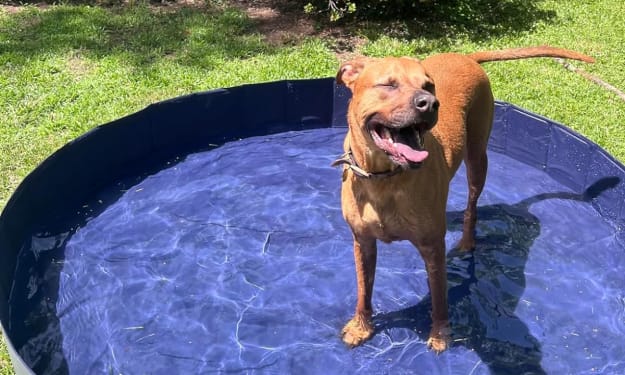How to Train Your Puppy to be the Best Dog Ever
Read this article to learn more..

The Comprehensive Guide to Puppy Training - A Step by Step Activity Guide: click here
Training your puppy to be the best dog ever can be a fun and rewarding experience. With patience, consistency, and a few basic tips, you can help your pup grow into a well-behaved, loving companion. In this blog post, we'll go over the basics of puppy training so that you can get started on the path towards a happy and obedient pooch. From house training to obedience commands, we'll explore the best strategies for teaching your pup how to be the best dog ever.
The Do's of Training
Training your puppy is essential to creating a strong bond with them and teaching them to be a well-behaved, happy pup. Here are some of the “Do’s” of puppy training:
1. Start early. Training should begin as soon as possible, when your puppy is around 8-10 weeks old. This is the prime time for them to learn and absorb new information.
2. Provide positive reinforcement. Puppies need positive reinforcement in order to form good habits. Use treats and verbal praise to reward them for correct behavior.
3. Set limits and boundaries. Establishing clear rules is important for puppies, as it helps them understand what is expected of them. Make sure your pup understands where their boundaries are, and enforce these limits consistently.
4. Be consistent. Consistency is key when it comes to training your puppy. Every family member should use the same commands and training techniques in order to avoid confusion for your pup.
5. Teach basic commands. Teaching basic commands such as “sit”, “stay”, and “come” will help you establish a good foundation for more advanced commands later on.
6. Socialize your pup. Socialization is key to helping your puppy adjust to different people, places, and things without getting overly stressed or anxious. Take your pup out to meet other dogs, go for walks in different locations, and visit public places so they can get used to different sights, sounds, and smells.
The Don'ts of Training
When it comes to training your puppy, there are a few things you should avoid. Many new puppy owners think that using punishments such as hitting, yelling, or even rubbing their nose in the mess is an effective way to train a puppy. However, this is not true. Punishing a puppy for making mistakes does nothing to teach them what to do instead, and can even have the opposite effect by creating anxiety and aggression in your pup.
Another thing to avoid is rewarding your puppy for negative behavior. For example, if you find yourself giving your puppy treats for barking or jumping up on people, then this can cause confusion and make it harder to train them. You should reward your puppy only when they are behaving positively.
Finally, you should avoid letting your puppy get away with bad behavior. Ignoring bad behavior may seem like it’s no big deal in the short-term, but it can actually make it harder to train them in the long run. It’s important to set clear rules and expectations, and make sure they know that they must follow them.
The Comprehensive Guide to Puppy Training - A Step by Step Activity Guide: click here
The Benefits of Training
Training your puppy is one of the best things you can do for both you and your furry friend. Not only does training give your puppy the opportunity to learn and grow, but it also provides many important benefits for the whole family.
1. A Sense of Structure: Training provides an important sense of structure for puppies. By following a consistent routine and learning rules, puppies become more comfortable in their environment, as well as understanding what is expected of them.
2. Improved Communication: Training helps to develop a stronger bond between you and your pup. By establishing a basic language with commands and cues, it becomes easier to communicate with each other. This improved communication will result in more successful interaction with each other, and a better understanding of each other's needs.
3. More Confidence: Training can increase your pup’s confidence by helping him or her to understand boundaries, commands, and expectations. When your pup successfully learns a new command or completes a task, they will feel a sense of accomplishment that boosts their self-esteem.
4. Better Behavior: Training teaches your puppy appropriate behaviors such as how to properly greet people, stay calm in social settings, and even basic tricks like “sit” or “stay.” By teaching these behaviors and reinforcing positive ones, you can help your puppy become a well-behaved and respectful pup.
Overall, training your puppy can provide a wide range of benefits to both you and your pup. From increased communication and better behavior to increased confidence and structure, the rewards of training your pup are truly priceless!
The Best Way to Train Your Puppy
Training your puppy should be a positive and enjoyable experience for both you and your pet. The best way to train your puppy is through positive reinforcement, such as rewards of treats or praise. This will help your puppy learn that good behavior is rewarded and will encourage them to repeat it.
It’s important to start teaching basic commands and behaviors early on, such as “sit” and “stay.” This can help your puppy understand what is expected of them from an early age. Additionally, consistency is key when it comes to training – make sure everyone in the house is using the same commands, cues and rewards for their pup.
When it comes to training sessions, short, frequent sessions are best. Sessions should be no more than 10 minutes in length and should be spread throughout the day. This will help your puppy stay focused and avoid getting bored.
It’s also important to remember that puppies are still learning and may make mistakes. Don’t scold your pup – instead, redirect their attention and offer positive reinforcement when they do something right. If you catch your puppy in the act of misbehaving, simply give them a firm “no” and move on.
Finally, remember to have patience and keep training fun! Your puppy should look forward to training sessions and associate them with positive rewards. By using these tips, you can ensure that you have a happy and well-trained pup!
The Comprehensive Guide to Puppy Training - A Step by Step Activity Guide: click here
About the Creator
Enjoyed the story? Support the Creator.
Subscribe for free to receive all their stories in your feed. You could also pledge your support or give them a one-off tip, letting them know you appreciate their work.






Comments
There are no comments for this story
Be the first to respond and start the conversation.